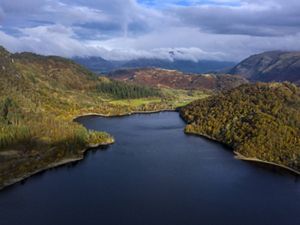Adapting to a Changing Climate
TNC supports the city of Berlin in adapting to climate change by harnessing nature.
Climate change is not a threat that’s headed our way in the future; it is here today and already has a profound impact on people’s lives across Europe and around the world. Globally, cities are now experiencing more frequent and intense heat waves and flooding, along with all the negative health impacts that come with such events. In 2017, Berlin endured a spring of devasting floods from Storm Axel, followed by summer heatwaves in 2018 that killed 500 people, prompting Berlin to declare a climate emergency for the first time in its history.
The alarming loss of biodiversity across natural and urban landscapes also adds to the urgency of the crisis, which is increasing everywhere. But for cities, one of the more effective solutions is to add more green space and utilize existing green space more effectively. By doing so, municipalities can not only protect their residents, they can also create more vibrant and enjoyable places to live and work. With recent restrictions to control the COVID-19 pandemic, urban green space is more important than ever, providing people places to play, exercise and get fresh air close to home.

“Just like engineers would plan for roads or buildings, ecologists need to plan where parks or wetlands could help cities be greener, healthier and more resilient to the impacts of climate change,” said Marianne Kleiberg, regional managing director for The Nature Conservancy's Europe Program.
That’s the idea behind the organization’s Urban Greening Program in Germany, which launched in June 2020: reduce risk by increasing biodiversity, reducing heat island effect and improving stormwater management—and create more livable and sustainable communities in the process.

Charlottenburg-Wilmersdorf as a pilot for urban greening
Kicking off in Charlottenburg-Wilmersdorf, a district in the western part of Berlin, with plans to roll out in two additional German cities, TNC Europe’s Urban Greening Program works with municipal partners to utilize the power of nature to enhance climate resiliency and adaptation, protect community health and well-being, and encourage biodiversity in the three cities.
The program received €3.75 million from the online retailer Amazon, the first project outside the United States to be funded through its $100 million Right Now Climate Fund.
"Cities like Berlin are on the front line in the fight against climate change and biodiversity loss," said Oliver Schruoffenegger, City Councilor, Berlin Charlottenburg-Wilmersdorf. "I welcome the commitment of The Nature Conservancy and Amazon to work together with the city of Berlin in our efforts to become greener. I look forward to working with both partners and local communities to define the best programs for our district."
How Melbourne is Using Greenprinting
The city has developed a greenprinting strategy that brings together diverse stakeholders.
Explore MelbourneIt will also be critical to ensure that the benefits of urban greening reach everyone. The project in Berlin is based on TNC’s global “greenprinting” methodology, which brings together key stakeholders to build a shared vision of how to protect biodiversity and use nature-based solutions to improve human well-being and increase climate resilience while making sure that everybody is heard. One aim of the project is to integrate urban greening principles with planned and on-going social infrastructure developments and to also prioritize underserved neighborhoods. Active public engagement and participation will ensure that community voices will be accounted for in the process.
Using a stakeholder- and science-based approach that looks to complement existing local efforts, the team will identify the best places for restoring green infrastructure among the gray. Possible sites could include roadsides, rooftops, unused lands and courtyards of schools and buildings.
Quote: Marianne Kleiberg
Just like engineers would plan for roads or buildings, ecologists need to plan where parks or wetlands could help cities be greener, healthier and more resilient to the impacts of climate change.
Urban greening pilots as a blueprint for other cities
Since the project launched in June, TNC has hired Maria Knaus, a scientist who is seconded to Charlottenburg-Wilmersdorf District Office to lead the cooperation with the municipal administration and to support the development of an integrated spatial urban greening plan for climate resilience, adaptation and biodiversity by December 2021. TNC also recruited a new inhouse urban planner, Jamie Chan, with extensive experience from New York City government to manage the program and the planned expansion to two additional cities.
"As the program advances, we will track our progress to make sure we deliver measurable benefits to the urban population. We intend to monitor outcomes such as the added areas of greened space, increased number of species, such as wild bees, reduced amount of stormwater runoff and lowered surface temperatures,” said Chan.
By the end of the five-year project, TNC Europe will create and share a guide to urban greening informed by lessons learned from the three pilots and facilitate a knowledge exchange between the three cities and key stakeholders across Europe so that other German and European municipalities can put similar plans into action.

A vision for cities in 2030
What will these cities look like when the project is complete? Picture native gardens supporting bees and other pollinators, tree plantings and urban wetlands absorbing and filtering rainwater, nature conservation areas that supply fresh air to the city, and water bodies that support diverse life and offer places to recreate—all of which will reduce pollution, flooding and heat island effect. It’s a challenging time for economies and societies around the world, but there’s also a unique opportunity to ensure Europe’s cities are ready for the challenges ahead. This program aims to demonstrate how cities can lead in adapting to climate change, both in support of strong national commitments as well as through independent action at the local level.
The Nature Conservancy in Europe
Learn about how we manage a portfolio of strategically important conservation work in Europe that contributes to our global conservation agenda and accelerates conservation impact across the globe.


